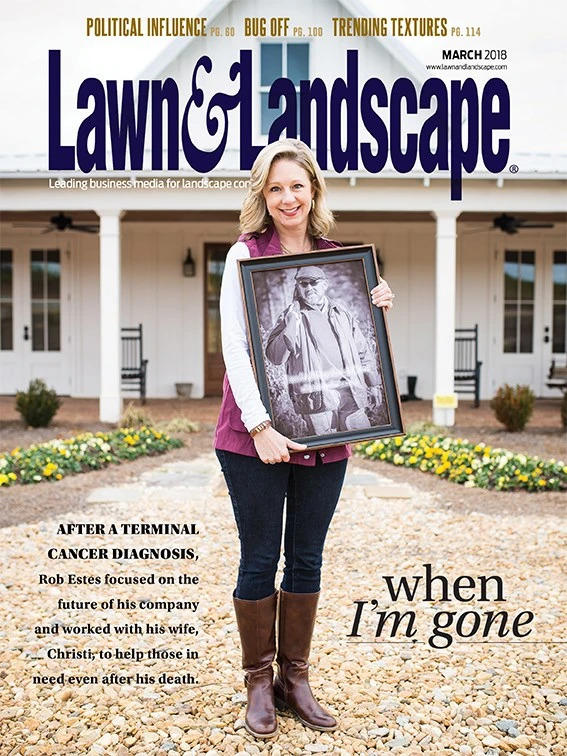It’s not fun to think about, and no one really wants to talk about it.
But we all have an expiration date on this earth.
While you may feel invincible now, your health can take a turn for the worse without much warning like it did for our cover story subject, Rob Estes.

We didn’t know about Estes’ circumstances before his death in December of 2017, so we didn’t get to speak with him, but through some colleagues, family and friends, we were able to learn about the man who owned Estes Landscape.
After his diagnosis, Estes knew he had to sell the business, and you can read about his approach on page 44.
While Rob’s story has its uplifting moments, there is a depressing reminder that the end can come quick. After you’re gone, those around you will grieve, but their lives will go on.
Your employees will continue to need a paycheck, your customers will continue to need services and your vendors will continue to run their businesses. Maybe your plan is to sell the business to the highest bidder and let the new owner determine the fate of your employees.
But, if your goal is to keep your company’s vision alive and for your employees to continue to carry out that vision, you’ll need to prepare.
We reached out to a few consultants to get their advice about what to do with a company if an owner gets sick and needs to step away for an extended period or sell altogether. The consensus was that it’s better to keep the process of a sale quiet, except in a crisis, when it’s better to be open about the situation.
“Find someone to stabilize the business so it’s in a place to be sold,” says Ron Edmonds of Principium Group Mergers and Acquisitions. “Have them take charge and assure customers and employees that things are going to be OK.”
The consensus was that it’s better to keep the process of a sale quiet, except in a crisis, when it’s better to be open about the situation.
Do you have someone who could take over and run the company at a moment’s notice? If so, have you talked to that person about that possibility? Do you have a general plan in place and have you discussed that plan with anyone?
It’s hard enough to have a plan for running the business day to day, so I understand the hesitancy to avoid the discussion of how things will run in the unlikely instance you die.
Again, it may not be the most pleasant conversation that you want to have, but it could be one of the most important.
A lot of the readers I talk to love landscaping, but they also have a sense of pride and responsibility to be able to employ people and help them make a living.
That pride and responsibility is great while you’re alive and should continue after you’re gone. – Brian Horn
Get curated news on YOUR industry.
Enter your email to receive our newsletters.
Explore the March 2018 Issue
Check out more from this issue and find your next story to read.
Latest from Lawn & Landscape
- Sunseeker unveils new X7 Series Robotic Mowers
- Bobcat Company debuts MT120 mini track loader
- Senske Family of Companies opens new corporate office
- Autonomowus Lawn Company adds robotic mowers to Genan tire recycling plant
- Visterra Landscape Group acquires Cleveland-based H&M Landscaping
- SiteOne names Carrothers VP of agronomic business development
- Batman and business
- Ever-changing landscape of SEO






